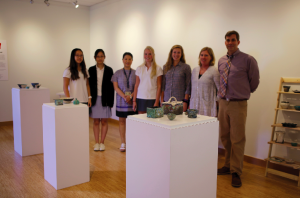Mary Cipperman ‘21:
Local ceramics artist Brett Thomas recently worked with the Episcopal Academy community to implement a Japanese-inspired technique of outdoor firing. The resulting pieces were then displayed in the Crawford Campus Center Gallery as a pop-up show.
Thomas’ program, Mobile Raku, features homemade glazes as well as two outdoor kilns. Traveling across the East Coast, Thomas says he aims to “share the joy of art.” His adds, “I envision Mobile Raku as the best way for reaching out to an ever-expanding circle of creative people. I hope to venture beyond the controlled space of the classroom setting in a way that will enable me to balance my journey of artistic discovery with helping other people explore the creative paths of their lives in unique and inspiring ways, which raku ceramics so perfectly embodies.”

The technique itself, which purposely creates cracks by suddenly changing the temperature, dates to the 1550s and was used for Zen Buddhist Masters’ ceremonial tea ware. With its distinctive crackle and black edges, Raku pottery exemplifies a unique cultural style. It also embodies a sense of “simplicity and naturalness,” Beth Peterson, writer for The Spruce, explains, as it uses each of nature’s elements: fire, water, earth, and air.
The process begins with clay. “We made a few pieces beforehand that were fired and ready to go. Then, on the day of the event, we applied special glazes and went to the process of the firing,” Danielle Clemmer, Registrar and Administrative Coordinator, remarks. Potters fire the pieces in special Raku kilns and then place pots in metal cans filled with wood shavings and newspapers.
Hilary Hutchison, Upper School Art Teacher, explains that a sudden change in temperature after firing causes thermal shock, which yields crackles and rainbow flashes on the surface of the work. “You can’t get that effect in an electric kiln, which is what we use here. It is a decorative effect that has to do with taking hot pots out of that 1850-degree Fahrenheit temperature into the open air. That’s what causes the glaze to crackle and that reduction to happen,” she says. Finally, artists then utilize water to cool the pieces and wash away residual ashes.
After completing summer programs for Raku pottery, Hutchison was able to bring Thomas to Episcopal. She says, “When I drew up the proposal for the sculpture garden, it included space to do outside firing. On the far end of it there’s a sort of stone paving area, so the idea of it was that we could bring in an outdoor kiln or a fire pit and do outside firing.” Hutchison elaborates, “I heard about [Thomas] through a man named Michael Ellis, who is also a ceramic artist, who has actually had a show here several years ago in the gallery. He works on our kilns.” She booked Thomas on Saturday, September 30, and invited students and faculty to participate in the workshop.
Izzy Lee ‘21 says, “My experience at the Raku gallery was extraordinary because the process of learning how the pieces were fired was interesting. I really liked how we all had to work as a group in order to fire the pieces and I’m thankful that Mrs. Hutchinson was able to provide this opportunity to the Episcopal students.”
Several members of the faculty also were involved. Clemmer explains, “[The event] was super collaborative and just a really cool experience all the way around. It was just really cool to get to work with the students and get to know some kids that I didn’t already know.” Others shared the sentiment. David Sigel, Chair of Visual Arts Department and Upper School Art Teacher, explains, “It was just nice to celebrate why we love art, and to see the support of the kids and adults who came, you know, giving up their time to come to this workshop on a weekend. It was so exciting to see everybody be inspired and amazed by this this magical process.”
The term, Raku, means “happiness in the accident” and Hutchinson hopes to continue that joy with students and faculty. Although Thomas could not come for this year’s JTerm, she says, “Hopefully, for next year, we’ll schedule him on time.” She hopes to spread the happiness from Raku to the rest of the Episcopal community.
Brett Thomas’ website is mobileraku.com.